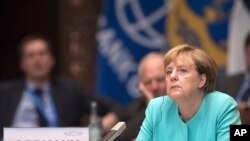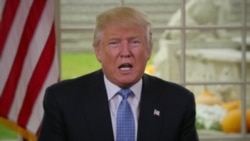German Chancellor Angela Merkel on Wednesday expressed her displeasure with U.S. President-elect Donald Trump for his plans to pull the United States out of the planned Trans-Pacific Partnership.
While Merkel didn’t mention Trump by name, she said she was “not happy” about the potential collapse of the trade deal and said future deals will not be as good.
"I will tell you honestly: I am not happy that the Trans-Pacific agreement now will probably not become reality. I don't know who will benefit from that,” she said. "I know only one thing: there will be other trade agreements, and they won't have the standards that this agreement and the hoped-for TTIP agreement have," said Merkel, referring to another deal under discussion, the Trans-Atlantic Trade and Investment Partnership.
In a video address released Monday, Trump said that on his first day as president, he would pull the U.S. out of the TPP trade deal, which he called “a potential disaster.” Trump has also said he wants to renegotiate the North American Free Trade Agreement, or NAFTA, with Canada and Mexico.
President Barack Obama has been a major proponent of the TPP trade deal.
"I think not moving forward would undermine our position across the region," Obama said during the recent Asia-Pacific Economic Cooperation (APEC) summit in Peru.
A final proposal of the TPP was signed earlier this year by leaders of 12 nations during a conference in New Zealand, but the deal will not take effect until six countries that make up 80 percent of the group’s gross domestic product ratify the document.
The United States makes up about 60 percent of the group’s combined GDP, making ratification impossible without U.S. support.






